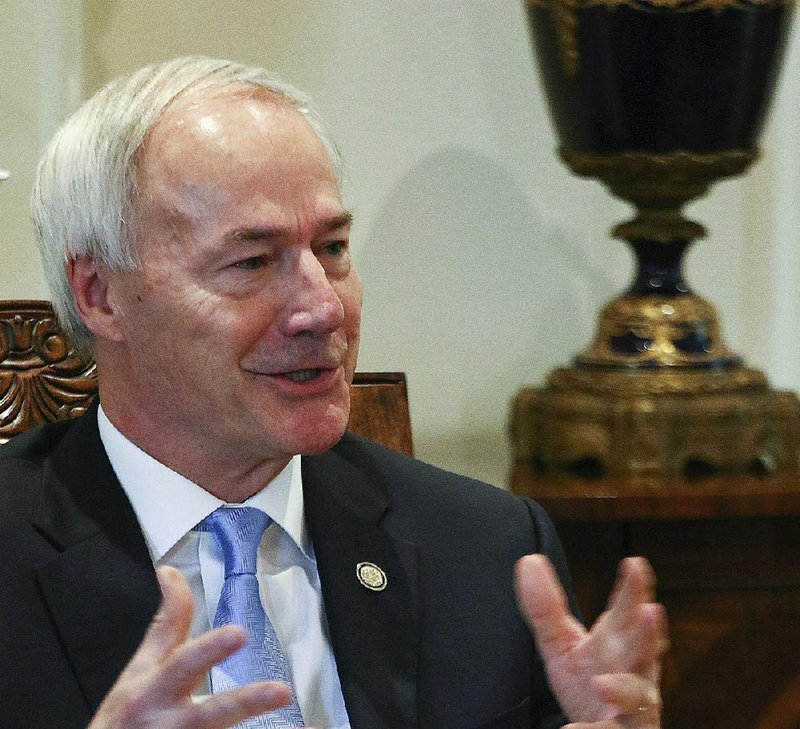Gov. Asa Hutchinson told reporters Thursday at the Governor's Mansion that his role in setting up a schedule of seven executions was "the heaviest and most serious responsibility" of his office, but one that arrived at his desk because of a history of circumstances beyond his control.
Those circumstances began decades ago with the murders committed by each of the men, Hutchinson said, taking the time to recount grisly details of the crimes to members of the Arkansas media who assembled in his living room to discuss the state's plans to resume the death penalty for the first time since 2005.

EXECUTIONS: In-depth look at 4 men put to death in April + 3 others whose executions were stayed
Click here for larger versions
The first-term Republican governor had been largely mum on the topic since scheduling the executions in late February.
Faced with extensive national and international media attention over the pace of the execution scheduling, Hutchinson fielded questions from local reporters in an hourlong session. Out-of-state news organizations were not invited to attend.
The story has attracted considerable attention in Europe, where most countries abolished the death penalty years ago.
Hutchinson lamented that coverage of the state's execution schedule has tended to focus on the prisoners rather than the victims of the crimes. He also said he was not concerned that the publicity regarding the executions would hurt the state in the long run.
"Europe has not stopped doing business in Texas," Hutchinson said.
Hutchinson originally scheduled eight men to die between this coming Monday and April 27. The number was later trimmed to seven after the Arkansas Parole Board voted to support Jason McGehee's bid for clemency and a federal judge stayed his execution.
The decision on whether to grant clemency rests with the governor, though Hutchinson said he has not come to a conclusion on any of the cases before him. Five of the prisoners he set execution dates for have sought clemency.
"It's not something that any governor seeks or wants, but it comes with the job," he said. "It has the most serious consequences of life and death; it is weighed heavily by the public, both in terms of the rightness of the action and the way it's handled."
Asked about the schedule for the executions -- which will be done mostly in pairs over 11 days -- Hutchinson said he felt more comfortable with that option than with scheduling three executions a day.
That decision was made after consulting with prison officials, though he did not offer specifics on what they said.
Arkansas' supply of midazolam, the sedative used under state law to begin the lethal-injection process, expires at the end of this month. Hutchinson has said the "circumstances" necessitated that the executions be done in April.
Hutchinson said Thursday that he believed death-penalty opponents would have fought the executions regardless of the schedule he set.
Before his media sit-down, Hutchinson said he toured the execution chamber at the Cummins Unit this week and reviewed twice-over the process that will be used to kill the inmates.
He expressed confidence that steps are being taken to ensure nothing goes awry, but again offered scant details, citing laws that allow much of the execution protocol to remain secret.
The governor said he does not question the guilt of any of the condemned men, although two continue to maintain their innocence. He added that he does not believe any went without a fair trial.
Hutchinson said he has met with John Melbourne Sr., whose 15-year-old namesake son was beaten and killed by a group of men led by McGehee in 1996. He said he also knows the families of other victims who he declined to identify.
Melbourne Sr. wept as he stood behind a framed picture of his son earlier this month and pleaded with the Parole Board to allow the execution to continue.
When asked if he believed the death penalty offered closure for the victims' families, Hutchinson said he could not claim to know because of a lack of personal experience.
He said he felt most would be comfortable seeing their family member's killer spend a life behind bars, but that they come to expect the death penalty when it is given by a jury.
The years of appeals, clemency hearings and last-minute stays are a "torturous path that these families go through," Hutchinson said.
In the cases of the eight men whose deaths he scheduled, the appeals process has been completed to no avail, leaving up to him the decision of when their sentences would be carried out, Hutchinson said.
At 7 p.m. Monday, when the first of two executions that day is scheduled to begin, Hutchinson said, he will either be in his office at the state Capitol or home at the Governor's Mansion, reviewing any last-minute legal action.
Metro on 04/14/2017
RELATED ARTICLE
http://www.arkansas…">2 drugmakers file to halt executions' use of wares
